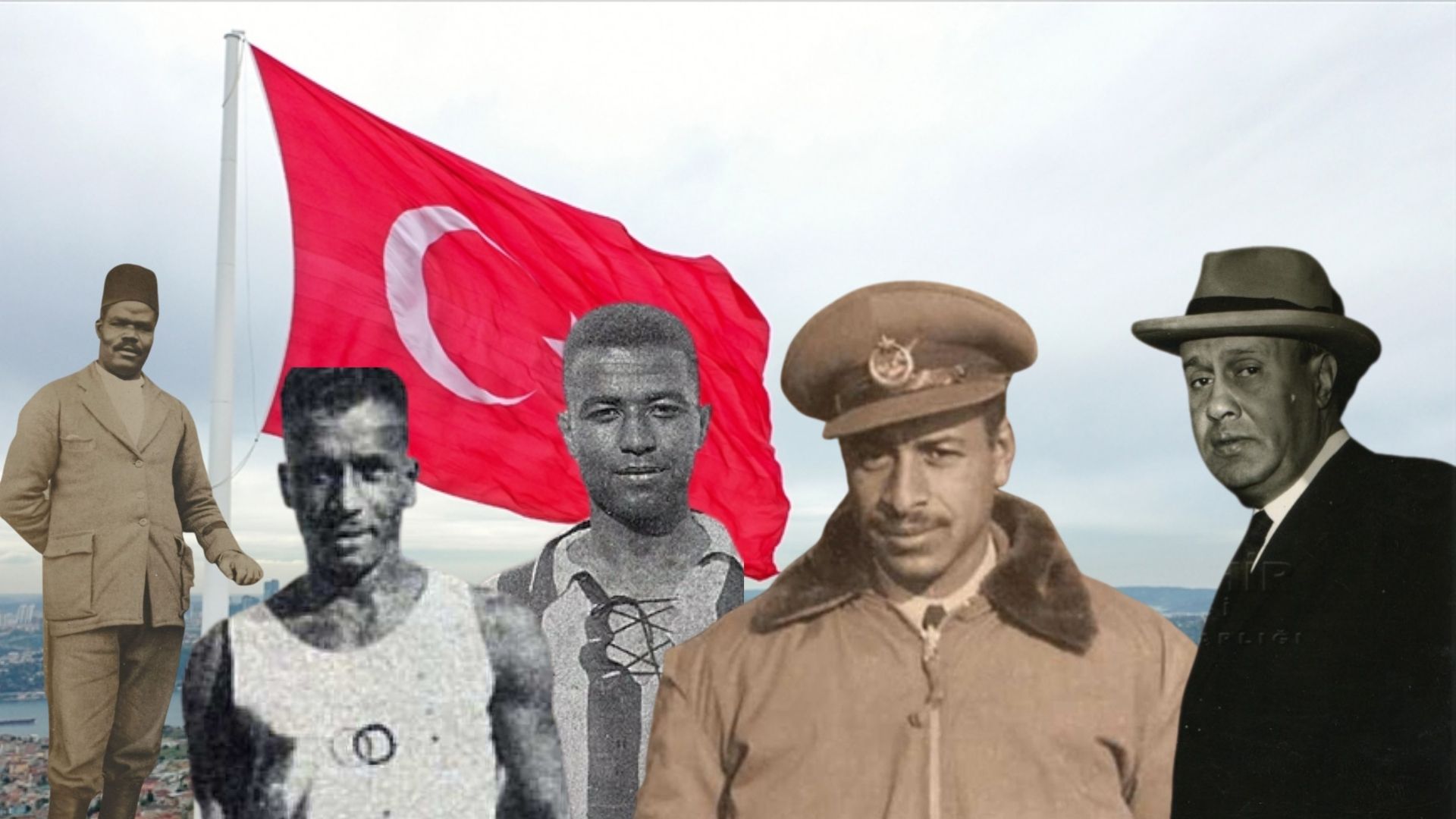
African presence in Türkiye dates back to the Ottoman Empire, where, in the 19th century, Africans were brought to Anatolia primarily from Zanzibar. These people, many of whom settled in the Aegean and Mediterranean regions, contributed to agriculture and established communities. Additionally, during the 1923 Türkiye-Greece population exchange, some people of African descent from Crete resettled in the Aegean region, particularly in Izmir.
Today, Afro-Turks are descendants of these historical migrants. Their legacy is also reflected in Türkiye’s sports history, with figures like Ahmet Ali Celikten, Vahap Ozaltay, and others making significant contributions and highlighting the rich cultural heritage.
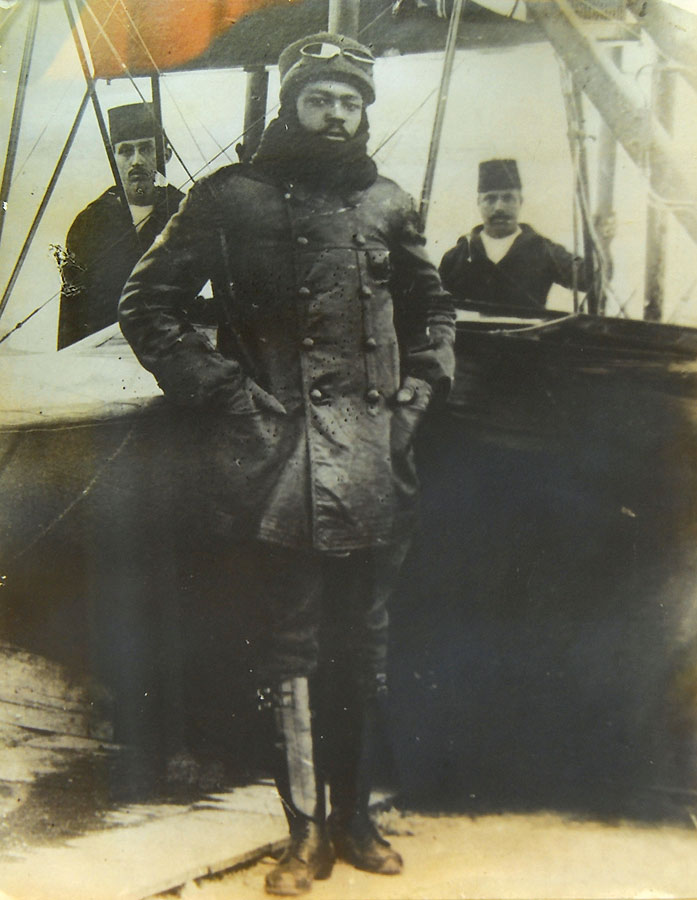
There is a long-debated topic among historians: Who was the world's first black pilot? In the 1915 debate between Ahmet Ali Celikten, an Ottoman soldier who graduated from the Bristol Flying School, and Eugene Jacques Bullard from the U.S., there is a broad consensus that both men completed their aviation training.
However, the wartime fates of both pilots amplify this debate.
Ahmet Ali Celikten was born in Aydin in 1883. Celikten's mother was Emine Hanim, a free woman born in Istanbul in the 1860s. She married Ali Efendi, a postal clerk of African descent, and settled in Izmir. Celikten spent most of his childhood surrounded by the sea, and in 1904 he entered the Haddehane School, which trained soldiers for the Ottoman navy.
After graduating in 1908, he joined the Ottoman Army as a lieutenant. Following his involvement in the Tripoli and Balkan Wars, he developed a keen interest in aviation. In 1915, he underwent pilot training in Bristol, England, where he obtained his flight certificate. A year later, he joined the Ottoman Air Force.
In 1918, after completing his studies in naval aviation in Berlin, Celikten returned to Türkiye. Following the confiscation of Ottoman airplanes by the Allied Powers during World War I, he became involved in the War of Independence.
He was appointed commander of air units in Konya, Eskisehir and Polatli and carried out air defense and navy protection operations against enemy forces crossing the Bosphorus Strait into the Western Black Sea.
Celikten returned to Izmir after the end of the War of Independence. He won the Bahri Tayyare Medal for shooting down a Greek plane that invaded Turkish airspace. In 1928, he was appointed undersecretary of air. After 12 years of service to the Ottoman Empire and 29 years to the Republic of Türkiye, Celikten died in 1969.
Historians state that Eugene Jacques Bullard was unable to serve as a fighter pilot because of discriminatory laws in the United States. Bullard was only able to fly in France in 1917 as a member of the French Foreign Legion. In this context, the notion that Celikten was the world's first black pilot gains weight.
Celikten's life left an important mark on the Ottoman Empire and the Republic of Türkiye. His origins and achievements in aviation have solidified his place in history.
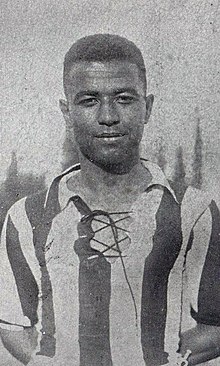
Vahap Ozaltay, a legendary figure in Turkish sports and a prominent member of the Altay Club, made history as the first Turkish footballer to transfer to Europe. Ozaltay was commemorated on the 55th anniversary of his death. He was known by the nickname "Black Pearl," because he was black.
There are some uncertainties about Ozaltay's date and place of birth. While some sources suggest 1907, others point to 1909. Additionally, there is uncertainty as to whether he was born in Beirut or Istanbul. At a young age, Ozaltay's family relocated to Izmir and then to Aydin. Due to the Greek occupation in 1919, they settled in Kastamonu. In 1922, they returned to Izmir.
Upon returning to Izmir, Ozaltay developed a passion for athletics and quickly gained recognition for his speed running abilities. However, he also excelled in soccer and made a significant impact on the field. At the age of 16, Ozaltay began playing for the Izmir Sultanisi team and later joined Altay, where he achieved remarkable success. By the end of 1931, Ozaltay had participated in eight Izmir League matches, winning five championships.
After the implementation of the Surname Law in 1934, he chose the surname "Ozaltay," inspired by Fahrettin Bey, the commander of the first cavalry unit to enter Izmir during the War of Independence, who adopted the surname "Altay."
Ozaltay's success in the world of football continued with his transfer to Racing, one of the most important clubs in France, in early 1932. This transfer made Ozaltay the first Turkish footballer to transfer abroad with a professional contract. Ozaltay, who drew attention in France, especially with his head goals, was highly acclaimed for his performance in the Racing team and the France squad.
After retiring from his playing career, Ozaltay transitioned to coaching, serving as a technical director. He shared his football expertise through his book, "How Football is Played." In 1954, he achieved a significant milestone by leading the Army National Team to the Inter-Army World Championship title.
On June 10, 1965, Ozaltay passed away due to a heart attack while delivering a speech at the general assembly of the Altay Club. In recognition of his contributions, Ozaltay Square in Izmir's Alsancak neighborhood was named after him, and a bust was erected in his honor. His legacy continues to be celebrated in various locations throughout the city.
Ozaltay was born on Sept. 12, 1907 in Beirut and died on June 10, 1965 in Izmir. Ozaltay is still remembered as a legendary figure of Turkish sports, and his legacy lives on in the world of sports and Izmir.
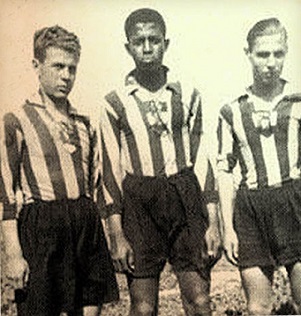
Fercani Bey took the surname Sener with the Surname Law and became the first black striker of Besiktas. He also served as an officer in the Turkish Armed Forces.
In 1922, Fercani Bey was a key figure in Besiktas' league success, and he was selected to represent Türkiye's football team at the 1924 Paris Olympics. However, according to historian Vala Somali, Fercani Bey was ultimately excluded from the squad. Somali recounted that when she inquired about this years later, Fercani Bey revealed that he had been omitted because he was black. Somali confirmed that he had verified the accuracy of this claim.
Due to economic difficulties in Europe, there was a debate at the time about whether or not to send athletes from Türkiye to the 1924 Olympics. President Mustafa Kemal Ataturk's announcement of allocating money from the slush fund led to the decision to send athletes to Paris. Fercani Bey successfully participated in these Olympics, ensuring Türkiye's representation in the football branch.
Despite not being part of the national team, Fercani Bey advanced through the ranks of the Turkish Armed Forces, eventually reaching the rank of colonel. After his football career, Fercani Bey, who left his mark as the first black football player in Besiktas' history, gained an important place in the military field.
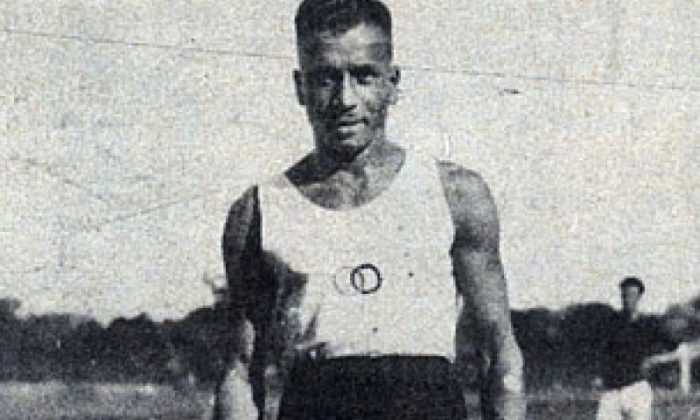
Omer Besim Kosalay is known as a talented athlete and a cheerful personality who left his mark on Turkish sports history. Born in 1899 in Aksaray, Kosalay made a name for himself with his achievements in his sports career. He was also one of Galatasaray's talented athletes and an important representative of Turkish athletics.
The story of Kosalay begins with a moment of emergency in Dolmabahce Palace. At a time when a horse that bit Sultan Abdulmecit II's hand required tetanus serum, Kosalay renowned for his youthful speed, swiftly intervened by running to the pharmacy to obtain the life-saving medication.
The 1924 Paris Olympics offered a unique experience for the athletes of the Republic of Türkiye, and Kosalay participated in this adventure. Although he did not win a medal at the Olympics, the time he spent in Paris and the memories he made cemented his place in sports history. Admiring the red tracksuits worn by American athletes in Paris, Kosalay brought these tracksuits to Türkiye and made them a symbol of an era in the sports world.
Kosalay started his sports life with wrestling, football and athletics and achieved great success, especially in long-distance running. Setting Turkish records in the 800 and 1500 meters, Kosalay represented Türkiye at the 1928 Amsterdam Olympics. However, due to an accident in a race, he could not return from the Olympics with the desired success, and the misfortunes he experienced in his sports career demoralized him.
Following his athletic career, Kosalay pursued a career in journalism, becoming a prominent figure in the sports section of Cumhuriyet newspaper. In his later years, he faced personal challenges, including grief and alcoholism. Kosalay succumbed to a heart attack on Nov. 11, 1956.
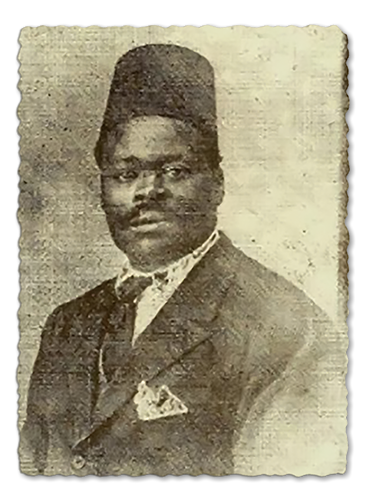
Black Musa, a Sudanese Ottoman soldier, was born in 1880 on the island of Crete and passed away in Istanbul in 1919. He is remembered for his role as a member of the Teskilat-i Mahsusa (Ottoman Empire's Intelligence Agency) and as a volunteer in the Ottoman Army, distinguished by his bravery and dedication on the battlefield.
Musa was born in Crete, but following his father's death, he relocated to Cairo to reside with his grandfather. Growing up in a Turkish-speaking neighborhood, he became proficient in Turkish. In 1911, he joined his grandfather in the Italian-Turkish War, where he encountered influential intelligence officer Kuscu Basi Esref and served as his orderly. Musa played a pivotal role in organizing local forces to resist the Italians during the conflict.
His military service extended beyond the Italian-Turkish War. He participated in the Balkan Wars, World War I, serving in various theaters, including the Sinai-Palestine Front, the Hejaz-Yemen Front, the Gallipoli Campaign, and the First Canal Campaign. Throughout these campaigns, Musa participated in both armed combat and intelligence activities.
Gen. Harington of the British Army allegedly offered Musa gold during the 1919 occupation of Istanbul in exchange for his allegiance to the British. Musa, however, refused the offer and maintained his loyalty to the Ottoman Empire.
After years of dedicated service, Musa succumbed to tuberculosis and passed away in Uskudar, Istanbul at the Uzbeks Dervish Lodge, which was under the care of Sheikh Ata Efendi. His grave is located in the cemetery next to the lodge. The cemetery has placed a commemorative plaque at a designated location due to the difficulty in pinpointing his exact resting place.
People celebrate Black Musa for his heroism during the late Ottoman period and the Turkish War of Independence. Intelligence officer Esref described him as a "brave man who fought with zeal for justice and the rights of his Muslim brothers." Additionally, Turkish poet Mehmet Akif Ersoy referred to him as the "Heroic Arab."
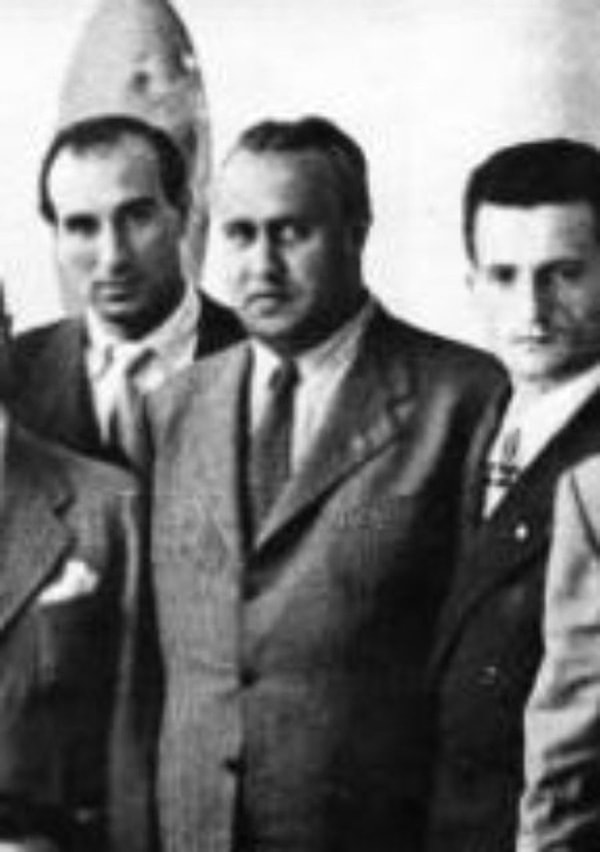
Sadri Usuoglu, born in Basra in 1908, is recognized as one of the prominent figures in Turkish sports history. His career spanned multiple disciplines, including football, basketball, and sports management, leaving a significant impact in each area.
For his education, Usuoglu moved to Istanbul and attended Robert College. While there, he participated in athletics, football, and basketball. Upon completing his studies, he embarked on his football career as a goalkeeper for Besiktas JK in 1924. His impressive performances with Besiktas led to his selection for the Istanbul representative teams. Due to his appearance, he was often called "Arabian Sadri." Usuoglu remained a pivotal player for Besiktas until 1930.
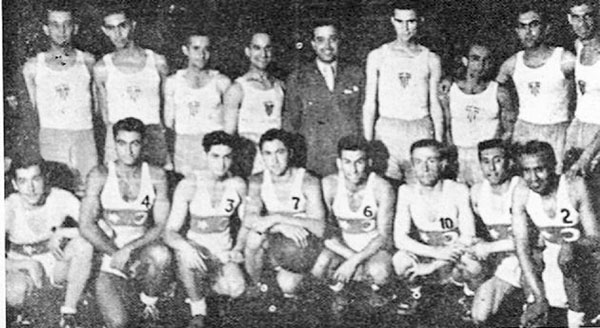
Following his football career, Usuoglu transitioned to basketball in the mid-1930s. In 1936, the newly established Turkish National Basketball Team selected him, and on June 24, 1936, he participated in Türkiye's first official match against Greece. Usuoglu was also a member of the Turkish team that competed in the 1936 Berlin Olympics.
After retiring from professional sports, Usuoglu continued to contribute to Besiktas JK in various administrative roles. He served as the team's head coach during the 1953-54 season, making significant contributions to the club. Additionally, in the late 1950s, Usuoglu was involved in the drafting of regulations for the professionalization of Turkish football.
Usuoglu passed away on March 15, 1987, in Istanbul. Besiktas supporters remember him as "Arabian Sadri" for his achievements in both football and basketball. His disciplined approach and versatile contributions to Turkish sports have cemented his place as a significant figure in Turkish athletic history.